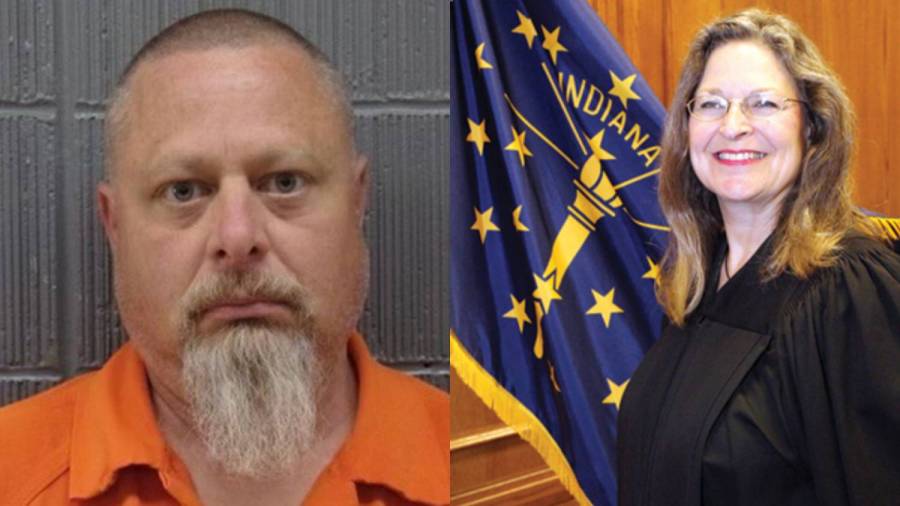CARROLL COUNTY, Ind. — The legal team for Richard Allen is claiming that Special Judge Fran Gull has violated time limits in ruling on the team’s Franks hearing motions, therefore causing the need for her to be replaced.
The new documents, filed on Thursday in Carroll County, focus on the third and fourth requests from Allen’s legal team surrounding the Franks hearing, which is an opportunity for a defendant to show that a false statement was knowingly included in an affidavit to help further along a case.
Allen has gone through a years-long legal process after being accused of killing Abby WIlliams and Libby German in Delphi in February 2017. Allen has been charged with four counts of murder after he was arrested in October 2022.
This is the latest in the defense’s repeated attempts to have Gull removed from the case. Gull was initially appointed by the Indiana Supreme Court as a special judge in the case after the original judge stepped down. No previous attempts to remove Gull have prevailed for Allen’s defense team. Even when the case went to the Indiana Supreme Court, the justices denied the request to remove Gull.
In the defense team’s latest attempt at removal, Allen’s attorneys claim that Gull violated Trial Rule 53.1 in the Indiana Courts which establishes a timeline for a court to rule on a motion. Under the rule, a court must set a motion for a hearing or enter a ruling on a motion within 30 days after a filing is made. Once a court hosts a hearing on a motion, the court then has 30 days to rule on the motion.
According to the rule, there are certain exceptions to Trial Rule 53.1, including:
- The parties or their counsel stipulate or agree on the record that the time limitation for ruling on a motion shall not apply or be extended for a designated period of time.
- The time limitation for ruling has been extended by the Indiana Supreme Court
- The ruling in question involves a repetitive motion, a motion to reconsider, a motion to correct error, a petition for post-conviction relief or a ministerial post-judgement act.
The rule states that if the chief administrative officer of the Indiana Office of Judicial Administration determines a ruling or decision has been delayed beyond what is laid out in Trial Rule 53.1, the officer “shall give written notice to the judge of the cause, the clerk of the trial court and the clerk of the Supreme Court of Indiana that the submission of the case has been withdrawn from the judge.”
“The CAO shall submit the case to the Supreme Court of Indiana for appointment of a special judge or such other action deemed appropriate by the Supreme Court,” the documents said.
In the argument, Allen’s legal team said that Gull has not ruled on its third Franks notice, filed on March 13, and its fourth Franks notice, filed on April 29. The team argues that the two motions are not repetitive, “as it contains completely new allegations and new information not previously alleged in previous Franks motions.”
According to previous reports, the team has alleged several errors in their motions for Franks hearings, including that law enforcement fabricated witness statements and omitted key facts to get a search warrant in the case and claims that investigators deceived a judge when filing for a search warrant.
However, despite the defense team claiming their motions are not repetitive, many of their allegations have already been ruled on by Gull who dismissed several of their accusations — including claims that investigators lied or omitted facts in their probable cause affidavit which was submitted to a judge in order for a search warrant to be granted for Allen’s property.
The team previously called on items and evidence seized during this search to be thrown out, citing these same allegations of an unjustified search, but Gull ruled against the defense team. In her decision, Gull said the probable cause submitted to the judge, “contained information that a reasonable belief existed that evidence of the murders would be found in (Allen’s) home and vehicles.”
Gull also said she did not believe the probable cause contained “false statements” or recklessly omitted facts.
On May 7, Gull issued a “pleading indicating” that the third and fourth requests for a Franks hearing “will be ruled upon and not set for hearing unless necessary.” There has not been a ruling since that pleading was issued.
“There is no hearing required on the motions related to the third and fourth Franks motions,” the documents read, “but the Court has still not ruled on these motions even though more than 30 days have passed since they were filed.”
It is unclear if Gull considers the motions repetitive since many of the same claims have been made by the defense team. A repetitive motion is ruled an exception according to the rules previously mentioned.
The defense team also argued that Gull did not rule on the team’s first Franks motion until 127 days after it was filed on Sept. 18, 2023.
Ultimately, the legal team is asking for the Carroll County Court’s clerk to enter the date and time of the filing in the clerk’s praecipe book, record the filing in the chronological case summary and forward the information to the executive director of the Division of State Court Administration.
This would be to start the process with the Indiana Office of Judicial Administration to potentially determine whether or not Gull would remain on the case.
Allen’s trial is now scheduled for mid-October in Carroll County.


